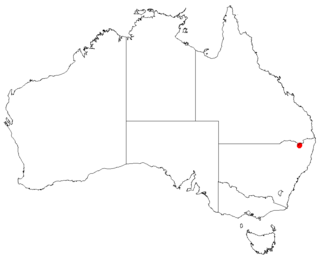
Homoranthus is a genus of about thirty species of plants in the myrtle family Myrtaceae and all are endemic to Australia. Plants in this genus share similarities with those in both Darwinia and Verticordia. They are shrubs with their leaves arranged in opposite pairs and with flowers appearing either singly or in small groups, usually in upper leaf axils. They are found in Queensland, New South Wales and South Australia. The genus was first described in 1836. None of the species is common nor are they well-known in horticulture.

Homoranthus papillatus, commonly known as mouse bush, is a plant in the myrtle family Myrtaceae and is endemic to a small area in southern Queensland. It is a compact shrub with curved, linear leaves and pale yellow flowers arranged in upper leaf axils.

Homoranthus biflorus is a plant in the myrtle family Myrtaceae and is endemic to a small area in northern New South Wales. It is an erect shrub with cylinder-shaped leaves and small groups of usually yellow flowers.

Homoranthus virgatus is a flowering plant in the family Myrtaceae and is endemic to coastal areas of northern New South Wales. It is an upright shrub with wand-like branches.

Homoranthus binghiensis is a plant in the myrtle family Myrtaceae and is endemic to a small area in northern New South Wales. It is an upright shrub with pointed leaves and usually paired yellowish to red flowers.
Homoranthus bruhlii is a plant in the myrtle family Myrtaceae and is endemic to a small area on the Northern Tablelands of New South Wales. It is an upright shrub with glabrous, pale green, linear leaves and with groups of three or four pale yellowish green flowers in leaf axils. It is only known from a single population near Tenterfield.

Homoranthus clarksonii is a plant in the family Myrtaceae and is endemic to a small area in Queensland. It is an upright shrub with pointed, linear leaves and pairs of creamy pink to pale yellow flowers which turn pink as they age. It is only known from small populations on Mount Mulligan.

Homoranthus coracinus is a plant in the myrtle family Myrtaceae and is endemic to a small area in Queensland. It is a low, spreading shrub with pointed, narrow egg-shaped leaves and groups of up to six flowers with black petals. It is only known from a single population in the Ka Ka Mundi part of the Carnarvon National Park.
Homoranthus cummingii is a plant in the myrtle family Myrtaceae and is endemic to a small area in Queensland. It is an upright shrub with pointed, linear leaves arranged in alternating opposite pairs so they form four rows along the branchlets. The flowers hang downwards in pairs and are creamy white to pale yellow, turning red as they age. It is only known from Mount Zero north-west of Townsville.

Homoranthus decasetus is a plant in the myrtle family Myrtaceae and is endemic to a small area in central Queensland. It has small, thin leaves and flowers that fade to purple as they age.

Homoranthus decumbens is a plant in the myrtle family Myrtaceae and is endemic to a small area in Queensland. It is a low, spreading shrub with cylindrical leaves arranged in alternating opposite pairs. The flowers are yellowish green and arranged singly in upper leaf axils.
Homoranthus elusus is a plant in the myrtle family Myrtaceae and is endemic to a small area on the Northern Tablelands of New South Wales. It is an shrub with linear leaves and with groups of up to four flowers in leaf axils. It is only known from a single specimen collected near Tenterfield.
Homoranthus inopinatus is a plant in the myrtle family Myrtaceae and is endemic to a small area in southern Queensland. It is an upright shrub with linear leaves and with groups of three to six flowers in leaf axils near the end of branchlets. It is only known from a single small population on private property near Ballandean.

Homoranthus melanostictus is a plant in the myrtle family Myrtaceae and is endemic to eastern Australia. It has cylinder-shaped to flattened leaves with blackish oil dots and up to six yellow flowers arranged in leaf axils near the ends of the branchlets.

Homoranthus montanus is a plant in the myrtle family Myrtaceae and is endemic to a small area in southern Queensland. It has narrow leaves and up to one to six small tubular, cream-coloured flowers arranged in leaf axils near the ends of the branchlets. As the flowers age, they turn red.

Homoranthus thomasii is a plant in the myrtle family Myrtaceae and is endemic to Queensland. It is a small shrub with spoon-shaped, greyish green leaves and small, pendulous, pink flowers in the upper leaf axils.

Homoranthus tropicus is a plant in the myrtle family Myrtaceae and is endemic to tropical north Queensland. It is a shrub with curved, club-shaped leaves and white flowers in a corymbose-like arrangement on the ends of branchlets.

Homoranthus vagans is a plant in the myrtle family Myrtaceae and is endemic to a small area in southern Queensland. It is an shrub with pointed linear leaves and with groups of up to ten yellow flowers in leaf axils near the end of branchlets. It is only known from a single population north of Inglewood.

Homoranthus zeteticorum is a flowering plant in the family Myrtaceae and is endemic to a small area in central Queensland. It is a tall shrub with axehead-shaped leaves and pendulous flowers with darker styles. It is only known from the Salvator Rosa section of Carnarvon National Park where it grows on Homoranthus Hill.
Lachlan Mackenzie Copeland(born 1973) is an Australian botanist, who obtained his PhD at the University of New England., with a thesis entitled Systematic studies in Homoranthus.














